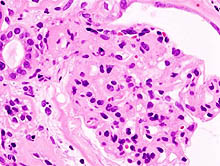| Home A B C D E F G H I J K L M N O P Q R S T U V W X Y Z |
|
Home |
Nephrosis: Symptoms, Causes
|
||
Nephrosis is a medical name for a condition that damages the kidneys. Also known as nephrotic syndrome, it occurs when small blood vessels of the kidneys don’t filter waste or remove excess water from the body like they’re supposed to. The damaged filtering system leads to an imbalance of proteins and urine within the body.
Afflicting all age groups, nephrosis is most commonly found in men, though children ages 2 to 6 may also experience its effects.
SYMPTOMS:
 Histopathological image of diabetic glomerulosclerosis with nephrotic syndrome. Click here for licensing details. |
Swelling (edema) is the most common symptom. It may occur:
Other symptoms include:
CAUSES:
According to the website Mercksource.com, “nephrotic syndrome is caused by various disorders that damage the kidneys, particularly the basement membrane of the glomerulus. This immediately causes abnormal excretion of protein in the urine.
“The most common cause in children is minimal change disease, while membranous glomerulonephritis is the most common cause in adults.
“This condition can also occur as a result of infection (such as strep throat, hepatitis, or mononucleosis), use of certain drugs, cancer, genetic disorders, immune disorders, or diseases that affect multiple body systems including diabetes, systemic lupus erythematosus, multiple myeloma, and amyloidosis.
“It can accompany kidney disorders such as glomerulonephritis, focal and segmental glomerulosclerosis, and mesangiocapillary glomerulonephritis.
“Nephrotic syndrome can affect all age groups. In children, it is most common from age 2 to 6. This disorder occurs slightly more often in males than females.”
Risks increase with diabetes, lupus, cancers and weakened immune systems, and according to Natural Remedies Encyclopedia the condition may be worsened by eating foods which a person is allergic to. This can include meat, wheat, junk food, greases, synthetic sugars, etc. Medicinal or street ![]() s can also trigger this condition. Overeating and eating too much protein can also worsen the condition.
s can also trigger this condition. Overeating and eating too much protein can also worsen the condition.
TREATMENT:
Treatment of nephrosis includes controlling the disease by treating any underlying medical conditions that may cause it. Commonly prescribed drugs include diuretics to reduce swelling, antibiotics to treat infection and medications to reduce the output of protein. Dietary changes are also usually prescribed for patients diagnosed with nephrosis. Other medications may be necessary depending on the underlying causes and other conditions that may be affected by the disease.
Left untreated, nephrosis may lead to infections, heart and kidney failure.
|
Glossary References Links Contact
|